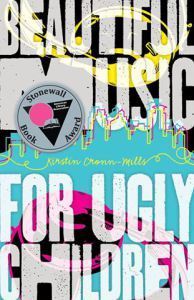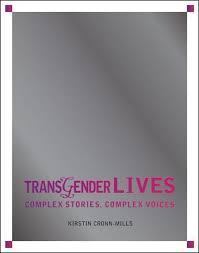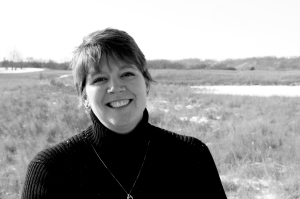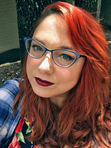Pride Week Guest Post from Kirstin Cronn-Mills: Holding the Space
Being an ally to the LGBTQ community can be a complex situation. The word “ally” has the synonyms of “associate,” “colleague,” “friend, “ “confederate,” “partner,” and “supporter.” Being a friend is a good thing, yes? Friends are always welcome! Well, not always, and for good reason. When you have privilege (me) and you’re trying to be a colleague or friend to someone who doesn’t have privilege (anyone in a marginalized community), you can automatically look like an enemy, no matter your intentions. And you can do stupid stuff that reflects your privilege, even when you’re trying not to be an idiot.

Flux Books, October 2012.
Some LGBTQ folks like having allies in their community, which is great fun. I get to meet new people, learn new things, and hang out with the cool kids. Some folks really hate allies and think we’re just cookie-seeking jerks, looking for a pat on the head. I understand that position, too, and I have met people who claim to be allies only to make themselves look good. Some folks are neutral about us, some don’t know what to think, and some are a mix of all the feels.
It makes sense, all the mixed-up thoughts and feelings—sometimes there’s a weird “so you think we need help, huh?” vibe when allies are present, and it’s uncomfortable. Allies aren’t perfect. I’ve been an ally for over twenty years, and over that time I have helped, I have hurt, I have screwed up, and I have learned. Every day is a new day to practice. After years of trying to figure out how to “do it right” (which varies from situation to situation and person to person, of course), I’ve finally decided that the best thing I can do—every time—is to create a safe space, then take my cues from the people in that space.
If a person who is LGBTQ wants me to be their friend, I’m up for that. If they need help, I’m here. If they want me to stay out of their way, I will. Whatever they need, I’m on it. But I make sure that, if I’m in ever charge of a space—a classroom, a meeting, a book event—it’s always a safe space for LGBTQ individuals. Always. No slurs, no jokes, no power plays, no stupidity. Just a safe, open space for people to be themselves.

21st Century Books, September 2014.
My ally life has a lot of forms. Sometimes I’m supporting family, friends, colleagues, and students. Sometimes I’m reminding my fifteen-year-old son that the homophobic culture surrounding teenage boys is not OK (“Really? You want to disrespect your Uncle Daisy like that?”). Sometimes I’m writing books. But always I’m trying to hold the space, no strings attached. I do it because all humans deserve that respect, and because I want the same thing for myself—I want to be loved for who I am. So it’s my job to create a physical, mental, and emotional place for that to happen for others.
Want to talk politics? I’m in. Want to shoot the bull about TV? I can do it all day. Want to sit quietly and just be? Excellent. Want me out of the room for a queers-only space? I’ll watch the door for you—on the other side of it. I wanted an ally when I was a teen and I didn’t manage to find one, so that feeling of needing someone to have my back is never far from my heart. Now it’s my job to be that person. Do for others as you would like done for you.
All of this is to say: I have your back, LGBTQ community, in whatever way you need me. I’m not perfect, but I’m teachable, and no matter how you feel about me, I have your back.

Kirstin Cronn-Mills.
Kirstin Cronn-Mills is a writer and a teacher who lives in southern Minnesota with her spouse and teenage son. Her first young adult novel, THE SKY ALWAYS HEARS ME AND THE HILLS DON’T MIND, was a finalist for a Minnesota Book Award in 2010. Her second novel, BEAUTIFUL MUSIC FOR UGLY CHILDREN, won a 2014 Stonewall Award from the American Library Association. Her first nonfiction YA book, TRANSGENDER LIVES: Complex Stories, Complex Voices, comes out in September.








